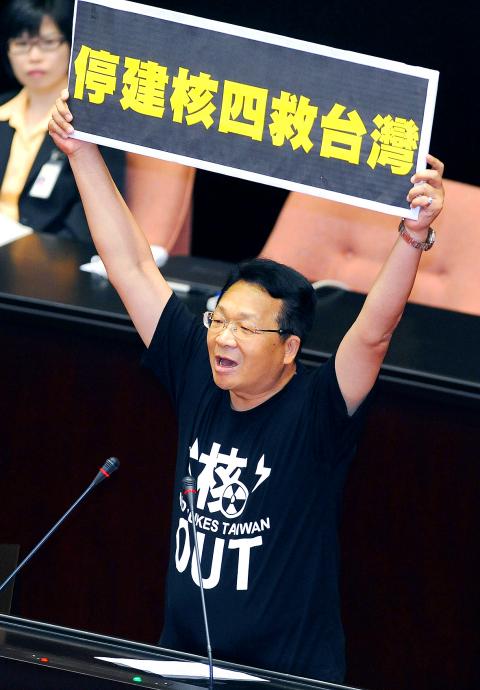Premier Jiang Yi-huah (江宜樺) yesterday panned the Democratic Progressive Party’s (DPP) plan to table a special statute for a referendum on the Fourth Nuclear Power Plant, saying it was irresponsible, cursory and concocted solely to help the DPP achieve the results that it wants.
The proposed statute would allow a referendum on the controversial project to pass with a simple majority vote. The Referendum Act (公民投票法) requires the participation of half of the nation’s eligible voters, half of whom must cast a “yes” vote for the plebiscite to be valid.
Jiang said the DPP has no “central credo” and takes referendum “as a child’s play.”

Photo: Liao Chen-huei, Taipei Times
“On the one hand, the DPP calls for a simple majority that would leave out the [current] threshold requiring the participation of 50 percent of eligible voters. That would mean that a majority of two people voting yes to halt construction of the Fourth Nuclear Power Plant in a three-people-vote would make the referendum valid — a type of referendum that is nowhere to be seen in the world,” he said.
Accusing the DPP of having “arbitrary, inconsistent” and double standards, Jiang cited another proposal by DPP Legislator Yu Mei-nu (尤美女) that would require all agreements signed with China to be put to a “stringent” referendum.
The proposal states that a referendum on a cross-strait agreement would require the consent of three-quarters of the legislators before being put to a vote, and would require half of the nation’s 14 million eligible voters’ affirmative ballots for it to pass.
“It is the most stringent regulation we have ever seen,” he said.
Based on these two proposals, it is not hard to see that the DPP is being arbitrary in dealing with issues about the referendum system, Jiang added.
“There is no consistency in its thinking as it all depends on the issue under debate. When [the DPP] wants a referendum to pass, the threshold should be lowered; when it is a controversial issue that it wants to axe, the threshold should be raised,” Jiang said.
DPP Legislator Wu Ping-jui (吳秉叡) later rebutted Jiang’s comments, saying that Yu’s version was a recommendation by a civil group, not by the party.
Wu added that the civil version’s proposal has a high threshold because cross-strait agreements concern the nation’s sovereignty.
DPP Legislator Chen Chi-mai (陳其邁) said that Jiang’s juxtaposition of the two versions of the referendum were like comparing “bananas and sunflowers,” adding that referendums involving issues relating to sovereignty and to public infrastructure were fundamentally different from the outset.
DPP Legislator Gao Jyh-peng (高志鵬) said that Jiang’s description of the DPP proposal as “a child’s play” was designed to mislead the public into thinking that the issue was merely political confrontation between the Chinese Nationalist Party (KMT) and the DPP.
According to a survey conducted by the DPP on Wednesday and Thursday, 80.4 percent of the public supports holding a national referendum to resolve the decades-long controversy over the Fourth Nuclear Power Plant, DPP spokesperson Xavier Chang (張惇涵) said, adding that only 12.7 percent opposes the proposal.
The survey also found that 79.2 percent of respondents in New Taipei City and 85.8 percent in Taipei agree that a referendum should be held to determine whether the plant should continue, he added.

The CIA has a message for Chinese government officials worried about their place in Chinese President Xi Jinping’s (習近平) government: Come work with us. The agency released two Mandarin-language videos on social media on Thursday inviting disgruntled officials to contact the CIA. The recruitment videos posted on YouTube and X racked up more than 5 million views combined in their first day. The outreach comes as CIA Director John Ratcliffe has vowed to boost the agency’s use of intelligence from human sources and its focus on China, which has recently targeted US officials with its own espionage operations. The videos are “aimed at

STEADFAST FRIEND: The bills encourage increased Taiwan-US engagement and address China’s distortion of UN Resolution 2758 to isolate Taiwan internationally The Presidential Office yesterday thanked the US House of Representatives for unanimously passing two Taiwan-related bills highlighting its solid support for Taiwan’s democracy and global participation, and for deepening bilateral relations. One of the bills, the Taiwan Assurance Implementation Act, requires the US Department of State to periodically review its guidelines for engagement with Taiwan, and report to the US Congress on the guidelines and plans to lift self-imposed limitations on US-Taiwan engagement. The other bill is the Taiwan International Solidarity Act, which clarifies that UN Resolution 2758 does not address the issue of the representation of Taiwan or its people in

US Indo-Pacific Commander Admiral Samuel Paparo on Friday expressed concern over the rate at which China is diversifying its military exercises, the Financial Times (FT) reported on Saturday. “The rates of change on the depth and breadth of their exercises is the one non-linear effect that I’ve seen in the last year that wakes me up at night or keeps me up at night,” Paparo was quoted by FT as saying while attending the annual Sedona Forum at the McCain Institute in Arizona. Paparo also expressed concern over the speed with which China was expanding its military. While the US

SHIFT: Taiwan’s better-than-expected first-quarter GDP and signs of weakness in the US have driven global capital back to emerging markets, the central bank head said The central bank yesterday blamed market speculation for the steep rise in the local currency, and urged exporters and financial institutions to stay calm and stop panic sell-offs to avoid hurting their own profitability. The nation’s top monetary policymaker said that it would step in, if necessary, to maintain order and stability in the foreign exchange market. The remarks came as the NT dollar yesterday closed up NT$0.919 to NT$30.145 against the US dollar in Taipei trading, after rising as high as NT$29.59 in intraday trading. The local currency has surged 5.85 percent against the greenback over the past two sessions, central